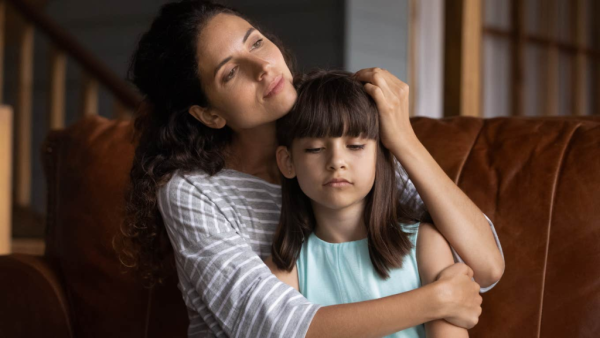
There are a handful of difficult conversations that parents know they need to have with their kids as they grow up, but how to broach the topic can feel scary. One of those topics is death, and what happens to us after we die. Kids are naturally curious, so eventually, whether it’s from talking with their friends or watching TV, they’ll start questioning concepts about death.
None of us knows what happens after we die, and so talking to kids about it can make some parents feel uneasy, especially considering they may not know where to even start. In a TikTok video, a mom named Penny acknowledged how difficult the death conversation can be, so she shared how she broke it down when talking about it with her kids.
“I keep seeing videos of parents talking about their little kids asking them what happens after you die, and a lot of parents are freaking out because they have not really thought about how they’re going to breach [sic] the subject with their kids when they ask, and they always ask,” Penny began in her video.
She explained that some parents have religious beliefs and personal beliefs surrounding death, so they already know how they’re going to speak about it with their kids. But for the parents who have neither, they might not know what to say at all. Penny admitted that she’s had the death conversation multiple times with her kids, so she figured she’d share what she usually says to them.
Media_Photos | Shutterstock
: There Are Secret ‘Wind’ Phones Hidden Around The World That Allow The Grieving To Talk To Loved Ones Who Have Passed
Penny recalled that when her kids would ask about what happens after we die, she would tell them that they just go to wherever it was they were before they were born. When they asked where exactly that was, Penny would be honest and say that she didn’t know, but that it might be a place or nowhere at all.
Children’s Hospital of Philadelphia (CHOP), bereavement experts Kelly Goldin, BS, CCLS, CTRS, and Elizabeth Spellman, MSW, LCSW, agreed that when it comes to talking about death and what happens afterward with kids, honesty is always best, including things you don’t know. They wrote, “Remember, it’s OK if you do not have an immediate answer. It is important for adults to use reflective listening skills and, if you don’t know, say, ‘I don’t know the answer to that, but I will try my best to find out.'”
Penny said she usually follows up her honesty with some of her own personal beliefs. “Either way, you’ve been there before because before you were here, if you were somewhere else, you were okay,” Penny described to her kids. “And if you were nowhere, you were okay too. So if you die and go somewhere else, you’ll be okay. But if you die and it’s nothing, you’ve been in nothing before and it was okay.”
: Child Psychologist Who Studied Over 200 Kids Says This Parenting Style ‘Works Better Than The Rest’
Most of the time, a child’s first introduction to death is usually after someone in their family has passed away, whether it’s a grandparent or distant family relative. However, it might be better to start talking about death with a child before they even experience grief.
Children can be quite literal, so it’s best to approach the topic with the facts first. If you try to use euphemisms, it might just end up confusing your child rather than informing them. It’s also good to be honest about what you do and don’t know. For example, Penny being honest with her kids that she wasn’t sure if it was an exact place or nowhere at all that we go to after we die, but she reassured her kids that they would be fine because they were fine before they were born.
“Parents should know that some children will ask questions, and some will not. Go at the child’s speed. If too much information is given at once, they may get more worried or confused. Some children’s questions come in spurts over several days or weeks as they try to make sense of what happened,” encouraged psychologist Rahil Briggs.
At the end of the day, conversations around death with your children just can’t be avoided, so it’s good to tackle their questions head-on rather than attempting to divert their attention away from the topic entirely. As long as you’re compassionate and understanding with your child, you can’t go wrong.
: Psychic Reveals What It Means When You Dream About Someone Who Passed Away
Nia Tipton is a staff writer with a bachelor’s degree in creative writing and journalism who covers news and lifestyle topics that focus on psychology, relationships, and the human experience.